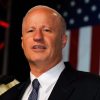The Christian film series “God’s Not Dead” has released five installments in the past ten years. (Most of my friends balked when I told them this.) The most recent, “God’s Not Dead: In God We Trust,” directs the series’ faith film scope towards national party politics – and its creators hope that their fictional narrative can create a real-world impact in this election.
The series is based on a 2013 evangelical self-help book of the same name. The first movie, released in 2014, centers around an evangelical college student debating the existence of the biblical god with an aggressively atheist philosophy professor. Crucially, this is not depicted as a legitimate, good-faith philosophical disagreement. The professor’s refusal to accept god’s existence is revealed to be irrational, spurred by his grief at the tragic death of his mother.
This is insightful for how the franchise views nonbelievers as a whole. In the “God’s Not Dead” cinematic universe, non-Christians are either future converts, deluding themselves, or malicious anti-Christian actors – or some combination of the three.
Installments in the series since then have gone deeper into the theme of Christians being persecuted by secular society and the government, with the second-latest installment in 2020 centering on a crackdown against a Christian homeschooling family.
“In God We Trust” attempts to take on what has become a buzzword in the years following the 2020 election: Christian nationalism. An incumbent Republican congressman from Arkansas unexpectedly dies six weeks before election day. Reverend Dave Hill, a supporting character from the 2014 film elevated to the central protagonist of subsequent installments, is recruited to become the new candidate. His opponent is Democratic state Sen. Peter Kane, a ruthless and power-hungry career politician intent on enforcing the separation between church and state.

The movie opens with Kane at a press conference giving his condolences for incumbent Rick West’s death. Almost immediately, he is hounded by journalists demanding answers on his plans to “restrict religious freedom.” While he walks away without answering these questions, behind closed doors Kane confides to campaign staffers that his opponent’s passing “may allow us to catch up with the rest of the modern world,” and gives a toast to “Enlightenment, reason and reshaping our nation’s core.”
Kane’s juxtaposition against the small town, Bible-thumping anti-politician Dave puts the film’s central conflict into focus. It’s a fight between conservative Christians with the values and worldview of the hard-working average Joe, and sneering elitists who call them backwards and superstitious, along with wanting to nebulously “restrict religious freedom.”
That’s one of the key problems with this film: while Dave gets fired up about vague ideas like “Christian values,” “small government,” and “standing up,” it’s rare that any of the characters bring up actual concrete policy positions. A sole exception goes to universal healthcare: during their live debate, Kane says he’s for it, saying the government should take care of its people, while Dave argues that it would require too much government spending, and vaguely gestures at a system where religious organizations (like his church) would fill that gap.
During that debate, Kane directly accuses the reverend of being a Christian nationalist. Dave complains “That’s not fair,” before launching into the following argument:
“Whenever anyone of faith promotes a policy you don’t like, you label them a Christian nationalist. Consider a Christian school board member who opposes books that are inappropriate for kids. Is she a nationalist? Or just a concerned parent?”
While speaking broadly on “books that are inappropriate for kids,” Dave neglects to state any further details. For instance, what books does this school board member oppose? Why are the books inappropriate for kids? In many cases, Christian school board members like the one Dave refers to have attempted to restrict or ban books for discussing LGBTQ people and related topics, which they oppose on the basis of their personal faith. But gay and trans people are never even mentioned by Dave, or in the film at all.
That’s the core problem with this film: it refuses to give Dave any concrete stances, perhaps because if it did, then people might find grounds to disagree with him and the film’s message as a whole. Because of these omissions, “In God We Trust” ends up being fundamentally disingenuous about what Christian nationalism represents and why people oppose it.
As stated before, Christian nationalists have attempted to use their political power to restrict the rights of LGBTQ people. These past few years, transgender people have been in the spotlight – here in Colorado, Christian-right activists rallied this year behind a set of ballot initiatives that would have had drastic impacts on the liberties of trans youths. These groups have also made efforts to block access to reproductive healthcare, and there are indications that many would also ban no-fault divorce. Christian nationalists using their faith to justify infringing on others’ rights is just the tip of the iceberg.
The film somehow manages to be even more dishonest with its fearmongering about the consequences of secular Democrats’ victory. One character recounts his family’s experience as Christian refugees of China’s Cultural Revolution, saying that the Chinese Communist Party “blamed all the country’s problems on religion and faith,” leading to religious persecutions and Christians being put into camps. “A similar revolution seems to be brewing here in America,” he continues.
Another character echoes this, warning that if Democrats win “They will have complete control … Hiding in the mountains is not gonna protect you from what’s coming.”
When it comes to the Christian nationalism debate, “In God We Trust” wants to have its cake and eat it, too. Dave, as the film’s mouthpiece for its messaging, refutes the allegations that he is a Christian nationalist. But his ideal government, and the one pushed by the film, is one where Christian voters elect Christian representatives to legislate based on Christian values. And the movie devotes a fair amount of its runtime to pseudohistorical, Barton-esque arguments that America was intended by its founders to be a nation by Christians, for Christians.
“In God We Trust” makes its goals clear: this film is not meant to be just entertainment, or even a hopeful message for people of faith, but a rallying cry for Christian nationalism. It repeatedly states that “40 million Christians don’t vote; another 15 million aren’t even registered.” This insistence that tens of millions of conservative Christians voters simply stayed home in recent elections is regularly repeated by religious right pollsters and Republican politicians, but there is little evidence to prove it.
While his campaign manager repeatedly urges him to put his faith aside on the trail, Dave’s insistence on turning every stump speech and debate into a sermon is all but stated to be what nets him a narrow victory over Kane by turning out a groundswell of Christian conservative voters. “Maybe people are looking for more spiritual and moral leadership in Washington,” he tells Mike Huckabee (playing himself) in an interview.

But you don’t need to see former Arkansas governor Huckabee’s cameo to understand that “In God We Trust” is a Republican political project. The creators have said so themselves: producer Michael Scott told Fox News that “[Christians] should vote for what we stand for … Choose the candidates that best align for you.”
He continued, “For me, as a Christian, I think we need to do that … I always say, let your voice be heard, let your vote be heard. I think it’s so important. And I think in today’s world, we have such a political divide. I don’t believe any one man’s going to fix that divide. I think if we put God in the center of that, that’s where we can see a difference.”
Christian nationalists’ efforts to weld their movement to the Republican party have been increasingly successful. Even Donald Trump has made efforts to pander to Christian votes with, among other things, collectible bibles. At a rally this weekend, he went so far as to call Democrats “demonic,” a turn of phrase usually reserved for Christian nationalist hardliners like Colorado’s own pastor-turned-legislator Scott Bottoms.
The creators of “God’s Not Dead: In God We Trust” seem to believe that strategies like these will pay dividends to Republicans at the polls. This week, we can expect to find out if that is really the case.




